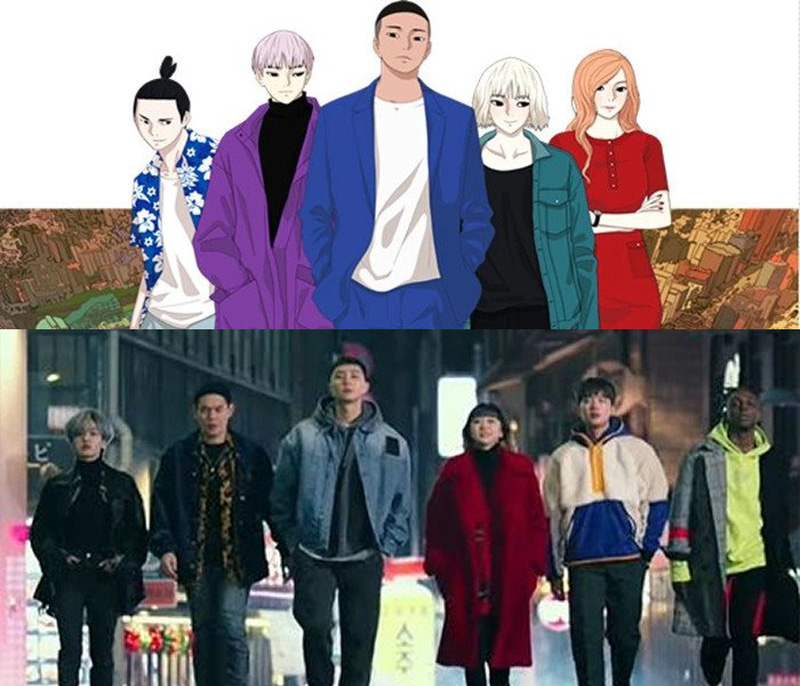

20 years and the explosive journey of Webtoon in Korea
In August 2002, online portal website Daum created a category called "Webtoon" on its platform.
Today, in Korea, Webtoon has grown strongly and in this article, we will see its journey to its current achievements. It's been a 20-year journey.
20 years ago...
In August 2002, online portal website Daum created a category called "Webtoon" on its platform. Following Daum, Korea's largest search engine and online portal Naver launched a similar platform in 2005.
Twenty years after its conception, webtoons have become a true industry of their own.
Korean webtoons have emerged as a powerful source of multi-applications that create enormous economic value not only in Korea but also globally. Domestically, it achieved revenue of 1.053 trillion won ($810 million) in 2020, up 64.6% from 2019 and surpassing the 1 trillion won mark for the first time.
According to a forecast by market research company Proficiency Market Insights in May, globally, the webtoons market size is at 3.7 billion USD in 2021 and is expected to reach 26 billion USD in 2028.
Webtoon has become a very important source that can create many other content products in accordance with the "one source, many uses" content consumption method" - Sung Dong-Kyoo, professor of communication at the University Chung-Ang, told The Korea Herald.
The trend of webtoons being adapted into globally popular dramas can be seen, with a long list of popular Korean dramas during the COVID-19 pandemic. These include "Itaewon Class" (2020), "Sweet Home" (2020), "D.P." (2020), "Hellbound" (2021), “Yumi‘s Cells” (2021) and “Work Later, Drink Now” (2021).
"Webtoon IP (intellectual properties) are the easiest source to create other content because they are like a storyboard. It's easy to turn them into video content" - Han Chang-wan, professor at the University Sejong, told The Korea Herald - "Considering the way we consume content has completely changed from TV to OTT platforms, webtoons and webtoon-related media will definitely disrupt the industry as a whole" .

20 years and the explosive journey of Webtoon in Korea - Photo 3. "Itaewon Class" and the 2020 webtoon version.
First motivation
Expanding beyond the boundaries of the Korean market, Korean webtoon companies have begun to flourish worldwide.
According to the Korea Creative Content Agency, eight of the country's webtoon platforms have entered foreign markets and 5,500 webtoon works have been translated in Korean as of 2020.
Naver Webtoon, which made its move out of Korea in 2014, now occupies the No. 1 spot among webtoon platforms in 100 countries including the US, Canada, Japan and France. Naver Webtoon provides content in 10 languages around the world, and its monthly active users reach 82 million, and 75% of them are foreign users.
More importantly, Korean webtoon companies have developed unique ecosystems in the countries they have set foot in. This is possible because Naver in particular has worked to ensure creators retain their IP rights. These efforts have not gone unnoticed. For example, "Lore Olympus" on Naver Webtoon's English platform was recently awarded best webcomic from the Will Eisner Comic Industry Awards, marking the first such achievement for a webtoon on a Korean platform .
"Amid the COVID-19 pandemic, webtoons have reached teenagers and people in their 20s globally, and now it seems they are familiar with the content on Korean webtoon platforms" - Han Chang -wan said.
"It's very meaningful that webtoons and web novels made by global creators have spread around the world on platforms made in Korea, and it's encouraging to see Korean companies Quoc became a leader instead of a follower quickly," added Sung Dong-Kyoo, a communications professor at Chung-Ang University.
Hurdle ahead
Experts here said that while webtoon is enjoying an era of growth, there are many barriers that need to be overcome.
.jpg)
20 years and the explosive journey of Webtoon in Korea - Photo 8.(Photo: (Naver Webtoon)
Considered a branch of the comic book industry, webtoon platforms are still fighting to be recognized as a separate industry.
"The policies are not geared towards the needs of the webtoon. Sometimes, laws related to cartoons are enforced, and other times, rules about animation or characters are applied to webtoons - this will vary with different circumstances. People perceive them differently," Seo Bum-kang, head of the Korean Webtoon Industry Association, told The Korea Herald.
Seo added that the Korean government and National Assembly should give webtoons independent industry status and encourage small and medium-sized platforms and
Content companies establish an ecosystem to promote the creation of more types of webtoons.
According to Professor Han of Sejong University, Korean webtoons, which suddenly gained attention, are going through a transition period amid the wave of globalization that neither writers nor readers are ready for.
The popularity of webtoons that initially gave them the attention they needed to grow as an industry may now contribute to the unspoken limitations placed on content creators due to the need to be read.
“The variety of webtoon genres has somehow narrowed, as readers only see what they want and writers only create what readers like. Now most of the topics are about school life, school gangs, fantasy romance or romantic comedy" - Professor Han said - "These genres may not attract a global audience and therefore That's why we need more diversity in genres."
Source: VTV



